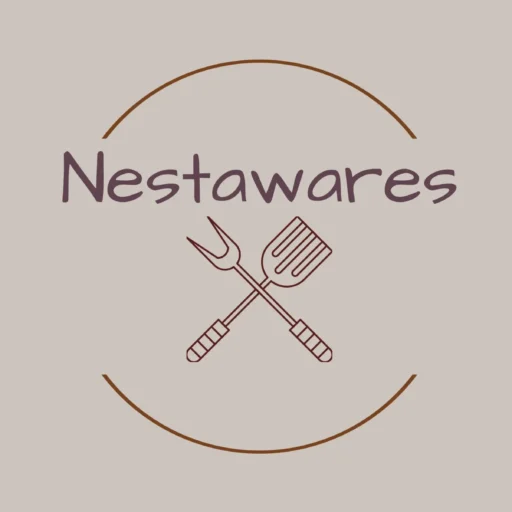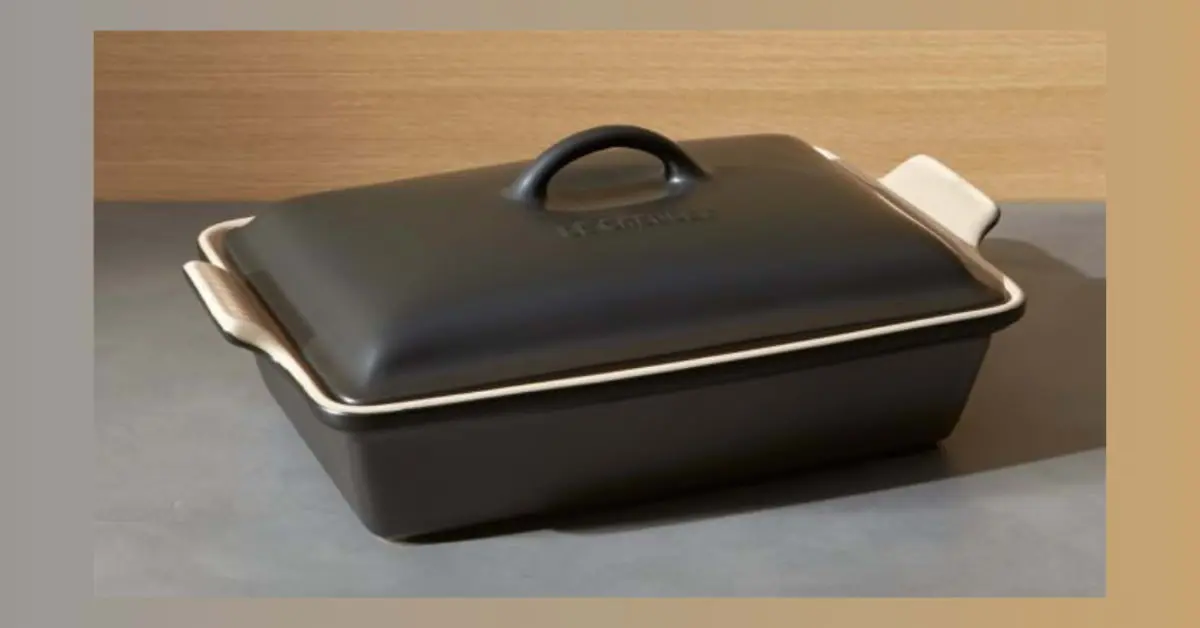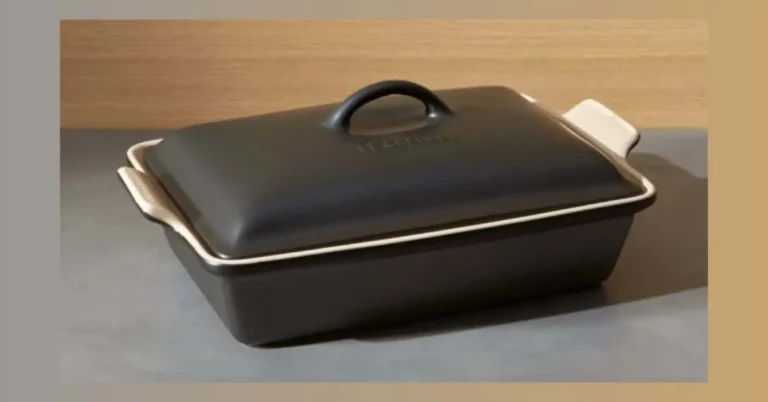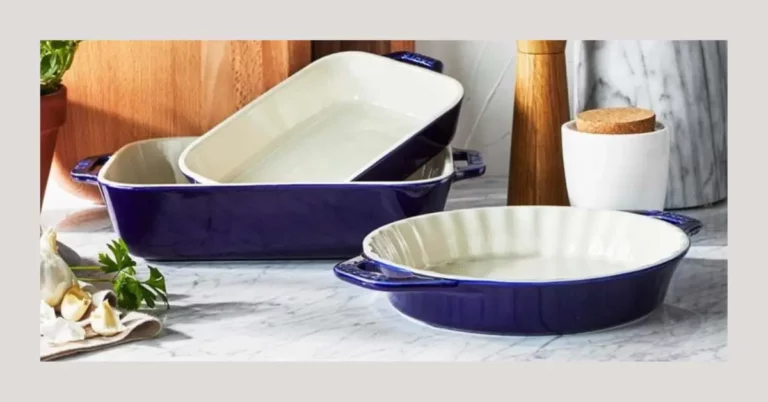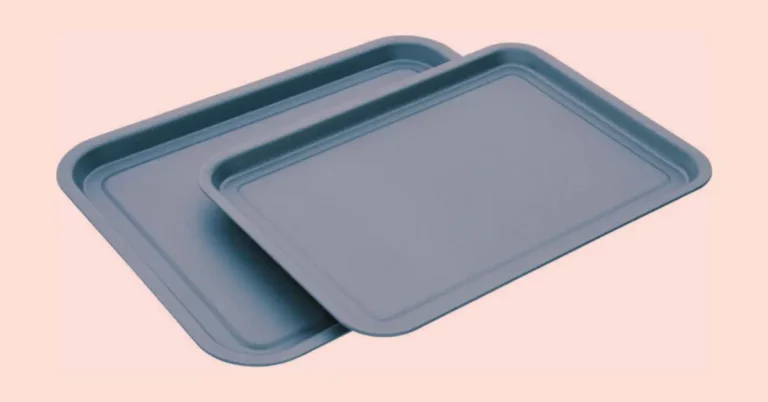Disclosure: As an Amazon associate, I may earn from qualifying purchases
Advantages of Stoneware
- Durability: Stoneware is very sturdy and can last for years if it’s taken care of properly. It is resistant to chipping and cracking, and it can withstand high temperatures without warping.
- Heat distribution: They distribute heat evenly, which can help to ensure that your food cooks evenly and comes out perfectly every time.
- Retains heat: They retain heat well, which means that your food will stay warm for longer periods of time.
- Versatility: They can be used for a wide range of cooking and baking tasks, from roasting meat and vegetables to baking cakes and breads.
- Attractive: Clay-based kitchenware is attractive and comes in a variety of colors and styles, which means that it can be used for serving dishes as well as for cooking.
Drawbacks of Stoneware
- Porosity: Stoneware is porous, which means that it can absorb liquids and odors from the food it comes into contact with. This can make it more difficult to clean and may also affect the flavor of subsequent baked goods.
- Weight: They are heavier than other types of cookware, which can make it more difficult to handle and manoeuvre, especially for those with physical limitations.
- Potential for cracking: These can be more prone to cracking or chipping than other types of cookware, especially if it’s subjected to sudden changes in temperature, such as going from the oven to a cold countertop.
- Longer preheating time: They may take longer to preheat than other types of cookware, which can add to the overall cooking time.
- Cost: Pottery ovenware can be more expensive than other types of cookware, especially if you opt for high-end brands like Le Creuset or Staub.
Frequently Asked Questions
Can you put hot food in stoneware?
Yes, you can put hot food in stoneware. They are designed to be used for baking and serving hot food, and it is able to withstand high temperatures.
Stone baking dishes can get very hot, so it is best to use oven mitts or pot holders to handle it. Additionally, it is recommended that you do not place them directly from the oven onto a cold surface or in water, as this can cause thermal shock and potentially lead to cracking.
Allow them to cool down to room temperature before washing it or placing it in the refrigerator or freezer.
Stone baking dishes can get very hot, so it is best to use oven mitts or pot holders to handle it. Additionally, it is recommended that you do not place them directly from the oven onto a cold surface or in water, as this can cause thermal shock and potentially lead to cracking.
Allow them to cool down to room temperature before washing it or placing it in the refrigerator or freezer.
Is Pampered Chef stoneware microwave?
Yes, Pampered Chef stoneware is microwave-proof. It is designed to be used in the microwave, as well as the oven and dishwasher. Again, remember to use oven mitts or pot holders to handle it.
It is also recommendeded that you do not place earthenware directly from the microwave onto a cold surface or in water, as this can cause thermal shock and potentially lead to cracking.
Allow them to cool down to room temperature before washing it or placing it in the refrigerator or freezer.
It is also recommendeded that you do not place earthenware directly from the microwave onto a cold surface or in water, as this can cause thermal shock and potentially lead to cracking.
Allow them to cool down to room temperature before washing it or placing it in the refrigerator or freezer.
Is Pioneer Woman stoneware oven safe?
Yes, Pioneer Woman stoneware is oven safe. It is designed to be used in the oven, as well as the microwave and dishwasher.
Does stoneware need to be preheated?
It is generally recommended to preheat clay-based bakeware before adding food to it. This allows the dishes to heat up gradually and evenly, which helps to prevent cracking and ensures that the food cooks evenly.
Preheating can also help to prevent food from sticking to the surface. To do this, simply place it in the oven as it is heating up, and allow it to come up to temperature along with the oven.
Be sure to use oven mitts or pot holders when handling the hot cookware.
Preheating can also help to prevent food from sticking to the surface. To do this, simply place it in the oven as it is heating up, and allow it to come up to temperature along with the oven.
Be sure to use oven mitts or pot holders when handling the hot cookware.
How do you keep stoneware from cracking?
- Preheat: Always preheat your stone-built dishes in the oven before placing any food on it. This allows them to heat up gradually and evenly, reducing the risk of cracking.
- Avoid extreme temperature changes: Do not take them directly from the freezer or refrigerator and put it into a preheated oven.
Similarly, do not place hot dishes directly into cold water or on a cold surface, as this can cause them to crack. - Avoid direct heat: Avoid placing clayware on the stovetop or under the broiler. They not designed for direct heat and can crack or even shatter if exposed to high temperatures.
- Don’t use metal utensils: Use non-metal utensils, such as silicone or wood, when stirring or serving food on enamel bakeware to avoid scratches or other damage to the surface.
- Proper cleaning: Avoid drastic temperature changes when cleaning them, such as immersing it in cold water while it is still hot. Allow them to cool down before cleaning it with warm soapy water and a soft sponge or cloth.
How do you keep food from sticking to stoneware?
- Season: Before first use, or after a long period of disuse, season your clay kitchenware by rubbing it with a small amount of cooking oil and baking it at a low temperature for about 30 minutes. This will help create a nonstick surface.
- Grease the surface: Before adding food, lightly grease the surface with cooking oil or butter. This will also help prevent sticking.
- Allow food to cool: Allow the food to cool for a few minutes before removing it from the stoneware.
- Soak: If food does stick to the surface, soak it in hot water for a few minutes to loosen the food particles. Then, use a non-abrasive scrub brush to gently remove the stuck-on food.
- Avoid using metal utensils: Using metal utensils can scratch the surface and make it more prone to sticking. Instead, use non-metallic utensils like silicone, wood, or nylon.
Is Pampered Chef stoneware safe?
Pampered Chef stoneware is generally considered safe for cooking and baking, provided that it is used and cared for properly.
They are made from natural clay materials, and it is free from lead, cadmium, and other harmful chemicals.
They are made from natural clay materials, and it is free from lead, cadmium, and other harmful chemicals.
Is stoneware food safe without glaze?
Stoneware without a glaze may not be safe for food use. The glaze on stoneware serves as a protective layer, preventing food from coming into direct contact with the porous clay material of the dish.
Without a glaze, they can absorb liquids and harbor bacteria, making it unsuitable for use in cooking or serving food.
It is always best to use earthenware that is specifically designed for food use and has been properly glazed to ensure safety and reliability.
Without a glaze, they can absorb liquids and harbor bacteria, making it unsuitable for use in cooking or serving food.
It is always best to use earthenware that is specifically designed for food use and has been properly glazed to ensure safety and reliability.
Can I use parchment paper in stoneware?
Yes, you can use parchment paper in stoneware. Parchment paper can be used as a liner when baking to prevent food from sticking to the surface.
Simply cut the parchment paper to fit the size of the dish and place it on the surface before adding your food.
This will help ensure that your food slides easily off the cookware after baking, and it will also make cleaning up easier.
Just be sure to follow any manufacturer’s guidelines on safe usage of their specific product, as some may have temperature limitations that parchment paper could exceed.
Simply cut the parchment paper to fit the size of the dish and place it on the surface before adding your food.
This will help ensure that your food slides easily off the cookware after baking, and it will also make cleaning up easier.
Just be sure to follow any manufacturer’s guidelines on safe usage of their specific product, as some may have temperature limitations that parchment paper could exceed.
Can you use metal utensils on stoneware?
It is not recommended to use metal utensils on stoneware as they can scratch the surface and potentially damage the non-stick properties of the glaze.
It is better to use silicone, wooden, or plastic utensils instead to avoid any damage.
It is better to use silicone, wooden, or plastic utensils instead to avoid any damage.
Can you bake bread in stoneware?
Yes, stoneware is great for baking bread as it provides even heat distribution and retains heat well, resulting in a crispy crust and
soft interior. You can use a stone-built bread baking dish or a baking sheet for use in the oven.
Just make sure to preheat them in the oven before placing the bread on it to prevent the bread from sticking to the surface.
soft interior. You can use a stone-built bread baking dish or a baking sheet for use in the oven.
Just make sure to preheat them in the oven before placing the bread on it to prevent the bread from sticking to the surface.
Is stoneware good for baking?
Yes, stoneware is good for baking. It is a popular choice for baking because it distributes heat evenly and retains heat well, which results in even baking and browning of food.
They also have a porous surface that allows for moisture to be absorbed, which can result in crispier crusts on baked goods like bread and pizza.
They are often very tough and can last for many years with proper care.
They also have a porous surface that allows for moisture to be absorbed, which can result in crispier crusts on baked goods like bread and pizza.
They are often very tough and can last for many years with proper care.
How do you prepare stoneware for baking?
- Wash: Wash the stoneware with warm soapy water before its first use. Rinse it thoroughly and let it dry completely.
- Season: Some bakeware brands recommend seasoning before the first use. This helps to prevent food from sticking to the surface.
To season, rub a light coat of vegetable oil over the entire surface of the stoneware using a paper towel.
Bake in the oven for about 30 minutes at 350°F (175°C). Let it cool down to room temperature before using it. - Preheat the oven: Always preheat the oven before baking. This helps to prevent the kitchenware from cracking due to sudden temperature changes.
- Use cooking spray or flour: You can use cooking spray or flour to prevent food from sticking to the stoneware. However, some brands recommend avoiding the use of cooking spray as it can leave a residue on the stoneware.
- Handle with care: Always handle the dishes with care. Avoid sudden temperature changes, or dropping or hitting the ceramic as it can cause damage to the body.
Can you put foil on stoneware?
Yes, you can put foil on stoneware when baking. In fact, using foil can help prevent food from sticking to the surface, and it can make cleanup easier.
Be sure to use caution when placing the foil on the stoneware to avoid scratching the surface. Also, be aware that using foil may affect the cooking time or temperature, so be sure to adjust accordingly.
Be sure to use caution when placing the foil on the stoneware to avoid scratching the surface. Also, be aware that using foil may affect the cooking time or temperature, so be sure to adjust accordingly.
Is it better to bake cookies on stoneware or metal?
Baking cookies on stoneware or metal pans both have their advantages and disadvantages, and which one is better ultimately depends on personal requirements and the type of cookies being baked.
Kiln-fired pans tend to have better heat retention and distribution, resulting in even baking and browning of the cookies.
They are also non-reactive, which means they won’t interact with acidic ingredients like lemon juice or vinegar, which can affect the flavor of the cookies.
However, they may take longer to preheat, and cookies may stick more to unseasoned or improperly seasoned pans.
Metal pans, on the other hand, heat up quickly and are generally more affordable than stoneware pans. They also tend to be easier to clean and have a smoother surface, making them less likely to cause sticking.
However, metal pans can have hot spots that can cause uneven baking and may react with acidic ingredients.
Kiln-fired pans tend to have better heat retention and distribution, resulting in even baking and browning of the cookies.
They are also non-reactive, which means they won’t interact with acidic ingredients like lemon juice or vinegar, which can affect the flavor of the cookies.
However, they may take longer to preheat, and cookies may stick more to unseasoned or improperly seasoned pans.
Metal pans, on the other hand, heat up quickly and are generally more affordable than stoneware pans. They also tend to be easier to clean and have a smoother surface, making them less likely to cause sticking.
However, metal pans can have hot spots that can cause uneven baking and may react with acidic ingredients.
Can you bake cookies on stoneware?
Yes, you can bake cookies on stoneware. In fact, this material is often a popular choice for baking cookies because it heats evenly and helps to prevent the bottoms of the cookies from burning.
To use it for baking cookies, preheat your oven and then place the cookie dough onto the faience, leaving enough space between each cookie to allow for spreading.
You can also lightly grease the surface or use parchment paper if you prefer.
Once the cookies are baked, allow them to cool for a few minutes before transferring them to a wire rack to cool completely.
To use it for baking cookies, preheat your oven and then place the cookie dough onto the faience, leaving enough space between each cookie to allow for spreading.
You can also lightly grease the surface or use parchment paper if you prefer.
Once the cookies are baked, allow them to cool for a few minutes before transferring them to a wire rack to cool completely.
How do you restore Pampered Chef stoneware?
To restore stoneware, you can follow these steps:
It’s important to note that Pampered Chef should not be washed in the dishwasher or with soap that contains citrus or chlorine bleach. Also, avoid soaking them for extended periods of time.
- Scrape off any food or debris from the surface with a plastic scraper or brush.
- Fill the sink or a large container with warm water and dish soap.
- Soak the dish in the soapy water for 10-15 minutes.
- Use a nylon brush or sponge to gently scrub it.
- Rinse it with warm water and dry it with a towel.
- To remove any remaining stains or odors, sprinkle baking soda on the bakeware and scrub with a damp cloth. Rinse with warm water and dry thoroughly.
It’s important to note that Pampered Chef should not be washed in the dishwasher or with soap that contains citrus or chlorine bleach. Also, avoid soaking them for extended periods of time.
Can you use vinegar on stoneware?
While vinegar is a versatile cleaning agent, it is not recommended to use vinegar on stoneware as it can damage the porous surface and cause it to break down over time.
It is better to use mild dish soap and warm water to clean it instead.
It is also better to avoid using abrasive scrubbers or harsh chemicals as they can also damage the surface.
It is better to use mild dish soap and warm water to clean it instead.
It is also better to avoid using abrasive scrubbers or harsh chemicals as they can also damage the surface.
Do you oil Pampered Chef stoneware?
No, it is not necessary to oil Pampered Chef stoneware before baking as they are designed to be non-stick. In fact, adding oil or grease can create a buildup on the surface over time, which can affect its performance.
It is recommended to clean your kitchen utensils thoroughly before each use, and use it as is, without any additional oils or sprays.
It is recommended to clean your kitchen utensils thoroughly before each use, and use it as is, without any additional oils or sprays.
